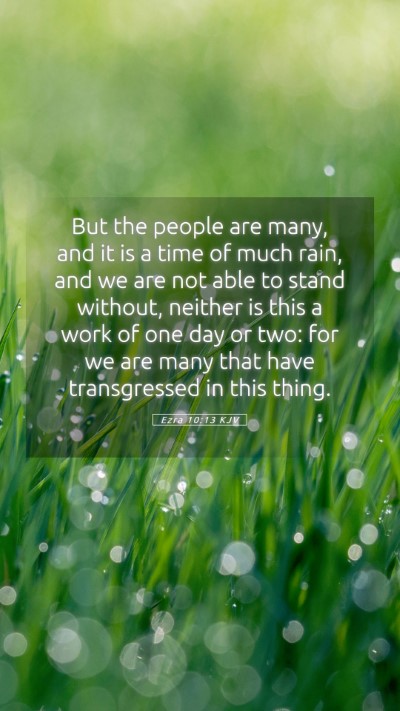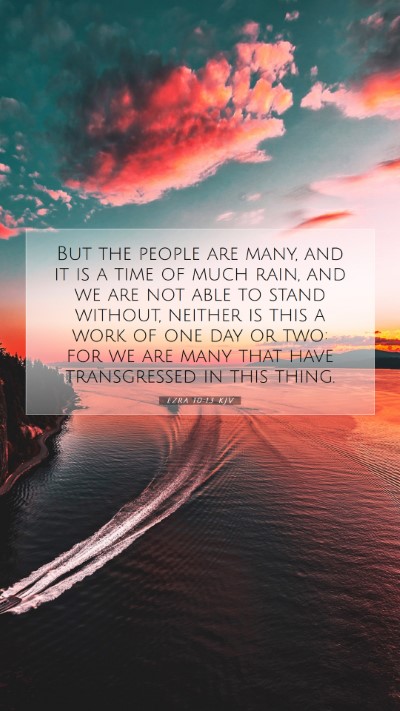Bible Verse Meaning: Ezra 10:13
Understanding Scripture is crucial for a deeper relationship with the Word of God. Ezra 10:13 presents a context where the returnees from Babylon faced a critical situation regarding marriage and community integrity. The verse reads:
"But the people are many, and it is a time of heavy rain, and we are not able to stand outside. Moreover, this is not a work of one or two days, for we have greatly sinned in this matter."
This verse encompasses several layers of meaning which can be unpacked through various public domain commentaries.
Interpretation and Commentary
The commentaries by Matthew Henry, Albert Barnes, and Adam Clarke provide rich insights into this passage:
1. Matthew Henry's Commentary
Matthew Henry highlights that the community must acknowledge their collective sins as they engage in the daunting task of correcting their wrongs. They recognized that their social and spiritual health depended on this action. He emphasizes the need for communal responsibility and the understanding that their disobedience has brought severe consequences.
- Collective Responsibility: Henry suggests that the people's acknowledgment of their many sins indicates a collective responsibility rather than just individual guilt.
- Civic Duty: The temporal context – heavy rain and exhaustion – signifies that spiritual matters often collide with practical realities.
- Call to Action: The mention of time frames indicates that restoration requires a sustained effort. The community's fortitude is essential.
2. Albert Barnes' Notes
Albert Barnes underscores the logistical challenges of the moment. He interprets "heavy rain" as a metaphor for the overwhelming difficulties facing the people, which serves to illustrate not just physical discomfort but symbolizes the weight of their sins. He draws out several insights:
- Labor Over Leisure: The phrase "not able to stand outside" indicates that solutions often require sacrifice and effort, even in adverse conditions.
- Prolonged Issues: He notes that the matters at hand are not solvable within a few days; this acknowledgment indicates the depth of their transgressions.
- Need for Collective Action: There is an emphasis on the necessity for concerted collective action to remedy their desperate situation.
3. Adam Clarke's Commentary
Adam Clarke provides a deeper historical and theological context, suggesting that the returning exiles faced the reality of their spiritual failures and social commitments. His insights include:
- Immediate Challenges: Clarke points out that the exiles recognized their dire circumstances; the rain metaphorically represents the flood of issues needing attention.
- Spiritual Apathy: The reference to the many sins indicates a period of neglect, highlighting the importance of spiritual adherence after restoration.
- Broader Implications: Clarke suggests that the outcomes of their decisions extend beyond their immediate lives, indicating that the community’s health translates into their relationship with God.
Believer's Application
In applying Ezra 10:13, individuals can reflect on the significance of personal and communal integrity. Key takeaways include:
- Accountability: Recognizing our roles in both community failures and success.
- Endurance: Even challenging circumstances require resilient faith and dedication to righteousness.
- Restoration Takes Time: Understanding that spiritual healing and community restoration are prolonged processes; sometimes, it requires ongoing effort.
Cross References
Several verses relate closely to Ezra 10:13, providing a broader context of its themes:
- Nehemiah 9:2: Describes the people's acknowledgment of their sins on a communal level.
- Malachi 2:14-16: Addresses issues of covenant faithfulness in marriage and community.
- 2 Chronicles 7:14: A verse echoing the call for national humbleness and turning away from sin.
Conclusion
In conclusion, Ezra 10:13 reveals the weight of communal and individual sin and the arduous journey necessary for restoration. Scriptural interpretation from commentaries lends depth to understanding the text's meanings and implications. Whether one studies this verse in a Bible study group, through online Bible study, or within personal devotions, the insights gleaned from Ezra encourage believers to reflect on their commitments within their faith community.


